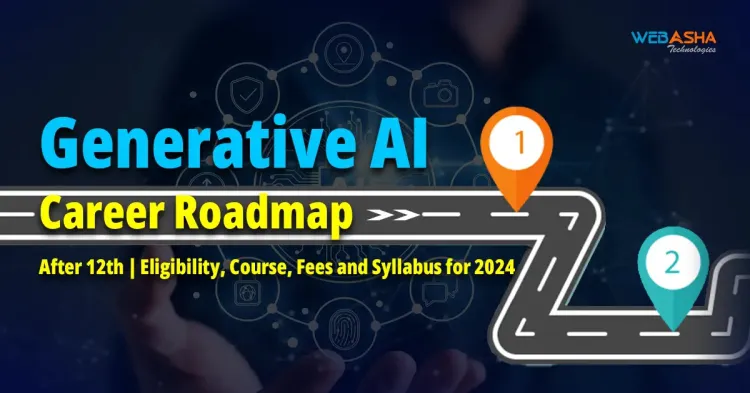Generative AI Career Roadmap After 12th | Eligibility, Course, Fees and Syllabus for 2024
Explore the career roadmap for Generative AI after 12th grade, including eligibility, course options, fees, and syllabus details for 2024. Learn about the pathways to becoming a Generative AI professional, including bachelor’s degrees, diplomas, and certification courses, along with essential skills and topics covered in AI education.

The rise of artificial intelligence has opened up exciting career opportunities, with Generative AI standing out as one of the most innovative and in-demand fields. Generative AI involves creating new content, such as images, text, music, or even entire virtual worlds, using advanced machine learning models. For students who have just completed their 12th grade, entering the world of Generative AI can be both a rewarding and forward-looking career choice. This guide outlines the career roadmap for aspiring Generative AI professionals, covering eligibility, course options, fees, and syllabus details for 2024.
Eligibility
To pursue a career in Generative AI after the 12th grade, students generally need to meet the following eligibility criteria:
-
Educational Background: Completion of 12th grade in the Science stream is preferred, with Mathematics and Computer Science as key subjects. However, students from other streams can also pursue this field if they have a strong foundation in mathematics and programming.
-
Skills Required: A basic understanding of programming languages (such as Python), mathematical concepts (linear algebra, calculus, probability), and an interest in artificial intelligence and machine learning.
-
Entrance Exams: Some institutes may require students to pass entrance exams, such as the Joint Entrance Examination (JEE) for technical courses or other relevant AI-focused aptitude tests.
Course Options
There are several paths you can take to build a career in Generative AI after the 12th grade:
Bachelor’s Degree Programs:
- B.Tech/B.E. in Computer Science with AI specialization: Offers a comprehensive education in AI and computer science fundamentals, including generative models.
- B.Sc. in Data Science and AI: Focuses on data science, machine learning, and AI concepts, with opportunities to specialize in Generative AI.
Diploma and Certification Courses:
- Diploma in Artificial Intelligence: Short-term courses that provide foundational knowledge in AI, machine learning, and neural networks.
- Online Certifications: Platforms like Coursera, Udacity, and edX offer specific courses in Generative AI, such as Generative Adversarial Networks (GANs) and Variational Autoencoders (VAEs).
Integrated Programs:
- Integrated M.Tech or M.Sc. in AI: Combines undergraduate and postgraduate studies, allowing students to delve deeper into AI and machine learning.
Course Fees
The fees for pursuing a career in Generative AI can vary based on the type and location of the course:
- Bachelor’s Degree: The average fee ranges from INR 1,00,000 to INR 5,00,000 per year, depending on the institution.
- Diploma and Certifications: Fees for diploma courses can range from INR 50,000 to INR 1,50,000, while online certifications can cost between INR 10,000 to INR 50,000.
- Integrated Programs: These courses may cost between INR 2,00,000 to INR 6,00,000 per year.
Syllabus for Generative AI Courses
The syllabus typically covers a blend of foundational AI concepts, advanced generative modeling, and practical implementation. Here’s a general overview of the key topics:
Fundamentals of AI and Machine Learning:
- Introduction to AI and ML
- Basic Algorithms and Data Structures
- Linear Algebra, Calculus, and Probability
Programming and Software Tools:
- Python Programming
- Libraries: TensorFlow, PyTorch, Keras
- Data Handling and Preprocessing
Deep Learning and Neural Networks:
- Neural Networks Basics
- Convolutional Neural Networks (CNNs)
- Recurrent Neural Networks (RNNs)
Generative Models:
- Introduction to Generative Models
- Generative Adversarial Networks (GANs)
- Variational Autoencoders (VAEs)
- Transformer Models for Text and Image Generation
Practical Applications:
- Image Synthesis and Editing
- Text Generation and Language Models
- AI Art and Creativity Tools
Capstone Projects and Internships:
- Hands-on Projects in Generative AI
- Internships with AI Labs or Companies
Expected Salary for various roles in Generative AI
| Job Role | Entry-Level (0-2 Years) | Mid-Level (3-5 Years) | Senior-Level (5+ Years) | Region |
|---|---|---|---|---|
| Generative AI Engineer | INR 6-10 LPA | INR 12-20 LPA | INR 25-40 LPA | India |
| $70,000 - $90,000 | $100,000 - $130,000 | $150,000 - $200,000 | USA | |
| Machine Learning Engineer | INR 5-8 LPA | INR 10-18 LPA | INR 20-35 LPA | India |
| $65,000 - $85,000 | $90,000 - $120,000 | $130,000 - $180,000 | USA | |
| AI Research Scientist | INR 8-12 LPA | INR 15-25 LPA | INR 30-50 LPA | India |
| $80,000 - $100,000 | $120,000 - $150,000 | $160,000 - $220,000 | USA | |
| Data Scientist | INR 6-9 LPA | INR 12-22 LPA | INR 25-40 LPA | India |
| $70,000 - $90,000 | $100,000 - $130,000 | $140,000 - $190,000 | USA | |
| AI Content Creator | INR 4-7 LPA | INR 8-15 LPA | INR 18-30 LPA | India |
| $60,000 - $80,000 | $85,000 - $110,000 | $120,000 - $160,000 | USA | |
| AI Consultant | INR 7-10 LPA | INR 15-25 LPA | INR 30-45 LPA | India |
| $75,000 - $95,000 | $110,000 - $140,000 | $150,000 - $210,000 | USA |
Notes:
- LPA stands for "Lakhs Per Annum," which is a unit of salary in India.
- Salaries vary based on factors such as location, company size, and industry demand.
- The salary ranges are approximate and can differ significantly with additional skills, certifications, and industry-specific expertise.
Career Growth in Generative AI
| Career Stage | Job Titles | Responsibilities | Skills Required |
|---|---|---|---|
| Entry-Level | Generative AI Intern, Junior AI Engineer | Assist in developing AI models, data preprocessing, basic coding tasks | Python, basic machine learning, data analysis, understanding of AI models |
| Junior Data Scientist | Work on data collection, cleaning, and exploratory analysis | Python, SQL, data visualization, basic knowledge of neural networks | |
| Mid-Level | Generative AI Engineer, AI Specialist | Develop and optimize generative models, collaborate with cross-functional teams | Deep learning frameworks (TensorFlow, PyTorch), GANs, VAEs, advanced Python programming |
| Machine Learning Engineer | Implement and deploy machine learning models, fine-tune algorithms | Model deployment (AWS, GCP, Azure), ML pipelines, advanced statistics, and optimization techniques | |
| AI Research Scientist | Conduct research, publish papers, develop novel AI algorithms | Strong research skills, knowledge of current AI literature, ability to innovate and experiment | |
| Senior-Level | Senior AI Engineer, Lead Data Scientist | Lead AI projects, mentor junior staff, oversee model development | Project management, team leadership, advanced machine learning, and AI model evaluation |
| AI Architect | Design AI systems architecture, ensure scalability and integration with other systems | System design, cloud computing, big data technologies, advanced AI frameworks | |
| Leadership | AI Manager, Head of AI | Manage AI teams, strategic planning, and oversee multiple AI projects | Leadership, strategic thinking, cross-functional communication, and deep understanding of AI applications |
| Chief AI Officer, Director of AI | Define AI strategy for the organization, ensure alignment with business goals | Business acumen, high-level AI knowledge, ability to drive innovation and digital transformation |
Key Points in Career Growth
-
Learning and Skill Development: Starting in Generative AI requires a strong foundation in programming (especially Python), mathematics, and basic machine learning concepts. As you progress, skills in deep learning, neural networks, and specific generative models like GANs become crucial.
-
Project Experience: Gaining hands-on experience with real-world projects, either through internships, open-source contributions, or company projects, is essential for moving from entry-level to mid-level roles.
-
Specialization: As you move to senior roles, specialization in areas like Natural Language Processing (NLP), computer vision, or specific types of generative models can set you apart.
-
Continuous Learning: AI is a rapidly evolving field. Continuous learning through advanced courses, certifications, and staying updated with the latest research papers and technologies is vital.
-
Leadership and Strategy: Moving into leadership roles requires not only technical expertise but also skills in project management, strategic planning, and an understanding of how AI can drive business value.
-
Networking and Community Involvement: Active participation in AI communities, attending conferences, and networking can provide opportunities for collaboration, learning, and career advancement.
Generative AI offers a dynamic and rewarding career path with opportunities for growth at every stage, from technical expertise to leadership roles, driven by a combination of skills, experience, and strategic thinking.
Conclusion
Pursuing a career in Generative AI after the 12th grade is an exciting journey into one of the most dynamic fields of technology today. With the right education, skills, and dedication, you can position yourself at the forefront of AI innovation, working on projects that shape the future of content creation, entertainment, and beyond. By choosing the right course, mastering key concepts, and gaining practical experience through projects and internships, you’ll be well-equipped to embark on a successful career in Generative AI in 2024 and beyond.
FAQs
1. What is Generative AI?
Generative AI refers to artificial intelligence systems that create new content, such as images, text, music, or videos, by learning patterns from existing data. It uses models like Generative Adversarial Networks (GANs) and Variational Autoencoders (VAEs).
2. What are the eligibility criteria to pursue Generative AI after 12th grade?
The basic eligibility includes completion of 12th grade, preferably in the Science stream with Mathematics and Computer Science. However, students from other streams with strong math and programming skills can also enter the field.
3. Which courses should I take for a career in Generative AI after 12th?
You can pursue bachelor’s degree programs like B.Tech/B.E. in Computer Science with AI specialization, B.Sc. in Data Science and AI, or short-term diploma and certification courses in Artificial Intelligence and Generative Models.
4. How much do Generative AI courses cost?
Course fees vary depending on the type of program and institution. Bachelor’s degree programs typically cost between INR 1,00,000 to INR 5,00,000 per year, while diploma and certification courses can range from INR 10,000 to INR 1,50,000.
5. What are the main topics covered in Generative AI courses?
Courses cover fundamentals of AI, machine learning, programming in Python, deep learning, neural networks, and specialized topics in Generative AI such as Generative Adversarial Networks (GANs), Variational Autoencoders (VAEs), and Transformer models.
6. Are there any online courses available for Generative AI?
Yes, several online platforms like Coursera, Udacity, and edX offer courses and certifications in Generative AI, covering essential skills and hands-on projects to help you get started in this field.
7. What skills are required to excel in Generative AI?
Key skills include proficiency in programming (Python), understanding of machine learning algorithms, mathematical knowledge (linear algebra, calculus), and familiarity with AI frameworks like TensorFlow and PyTorch.
8. What career opportunities are available after completing a Generative AI course?
Career opportunities include roles like AI Engineer, Machine Learning Engineer, Data Scientist, AI Researcher, and AI Content Creator. These roles are in high demand across industries such as technology, entertainment, healthcare, and finance.
9. Can I pursue a master’s degree in Generative AI after completing my bachelor’s?
Yes, after completing a bachelor’s degree, you can further specialize with a master’s degree in AI, Machine Learning, or a related field to deepen your knowledge and improve job prospects.
10. What is the job market outlook for Generative AI professionals?
The demand for Generative AI professionals is growing rapidly due to the increasing adoption of AI across various sectors. With skills in Generative AI, you can expect strong job prospects and competitive salaries.





![[2024] Top 100+ VAPT Interview Questions and Answers](https://www.webasha.com/blog/uploads/images/image_100x75_6512b1e4b64f7.jpg)








